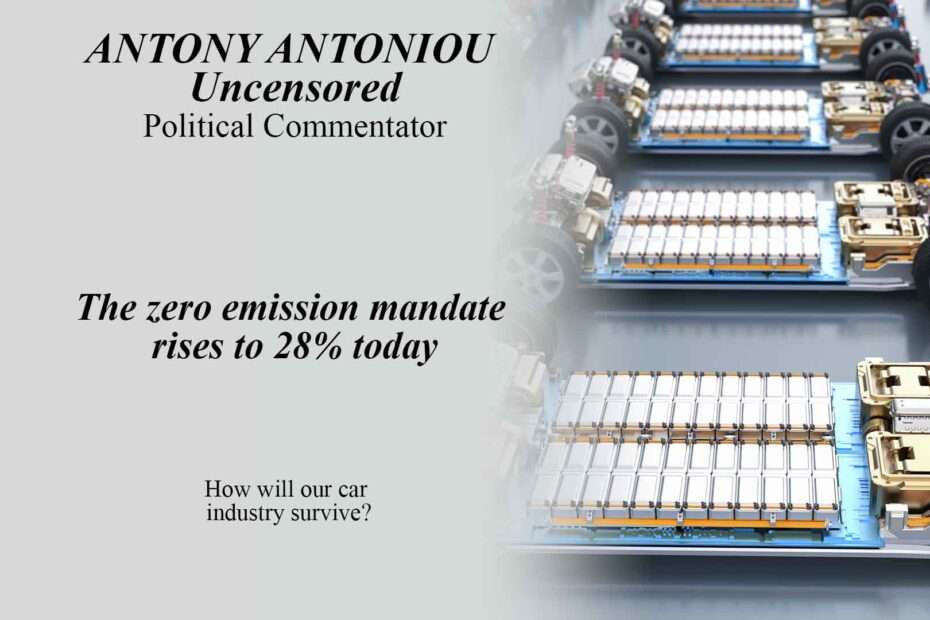The zero emission mandate rises to 28% today
The zero emission mandate was introduced last year, forcing car manufacturers to sell a minimum of 22% zero emission vehicles, or face fines of £15,000 for every internal combustion engine vehicle sold above 78%.
In its first year, the mandate which is implemented across the EU in one for or another, has resulted in job losses at Ford, the closure of the Vauxhall car plant in Luton and Nissan axing 9,000 jobs in Sunderland.
In the meantime, VW, one of the most successful car manufacturers in history is teetering on the edge, with the real prospect of two manufacturing plants being closed in Germany, for the first time in its 87 year history. At the same time, shares in companies like Ford and Mercedes are trading for less than they did back in 2008.
If this is not enough, the Zero emission mandate rises to 28% from today, which will only serve to exacerbate the damage to European motor manufactures, with consumers being the end victims, as dealers are capping the number of ICEs that they make available, to avoid falling foul of these ridiculous laws, but no matter what they do, the number of vehicles that we actually want that are entering the pipeline are reducing drastically, if anyone thinks this is about emissions and climate change, they would be very wise to think again.
Another interesting fact that has recently come to light, is that despite the narrative from the media about the large take-up of used EVs the reality is quite different.
It has been noted by motor traders across the UK, that over 55% of used EVs are sold within 6 months of being bought, with many of them having had several owners, each successive owner dumping their reckless purchase even faster than the one before.
Once again, any contradiction to the narrative, is met with hostility and slander by the climate zealots, who are so blinkered that they are doing the dirty-work for the globalists who want to take your cars away from you.
I stand by my initial thoughts, that this is not about emissions, but more about control, restrictions and the gradual erosion of our way of life as we know it.
Whilst the driving experience of EVs may be appealing, life with a car that cannot be refuelled on the fly, is at best stressful and at worst an absolute nightmare.
Having said that, there is a place for everything and I have no doubt that for those with a drive or garage, where they can keep a small city run-around on charge for whenever it is needed, may be convenient, like a rechargeable vacuum cleaner, but for the millions who do not have a drive, being at the mercy of public chargers is neither convenient, nor cheap.
A quick check revealed that the current rate for charging at the Northampton services today is a whooping 79p/kwh, and whilst most owners will charge at home, if they can, we all know that nobody fuels up on the Motorway unless they have to, but even so, there are thousands who do.
There is nothing wrong with evolution and EVs should have been allowed to evolve, and compete on a level playing field, which would have relied more on the development of more convenient energy sources, before these things were forced on the public, but as it stands a very high price is being paid across Europe, in fact the price is so high that we must ask ourselves why!
The rapid rise of the EU’s zero emission mandate from 22% to 28% has triggered significant disruption across the European automotive sector. This mandatory transition to electric vehicles has created substantial challenges for both manufacturers and consumers, with widespread industry implications and practical concerns about EV adoption.
Key points:
* Major job losses have occurred across the automotive sector, including 9,000 redundancies at Nissan Sunderland, the closure of Vauxhall’s Luton plant, and workforce reductions at Ford
* Volkswagen, a cornerstone of European manufacturing, faces potential closure of two German plants for the first time in its 87-year history, whilst Ford and Mercedes shares have fallen below 2008 levels
* The used EV market shows concerning trends, with over 55% of vehicles being resold within six months of purchase, suggesting significant user dissatisfaction or practical difficulties
* Charging infrastructure remains problematic, particularly for those without home charging capabilities, with motorway service stations charging premium rates (currently 79p/kWh at Northampton services)
* The mandate’s implementation has led to dealers restricting ICE vehicle availability to meet targets, effectively limiting consumer choice and market dynamics
* While EVs may suit certain scenarios, particularly for those with home charging capabilities, the rapid, mandate-driven transition appears to be creating significant challenges for both industry and consumers

